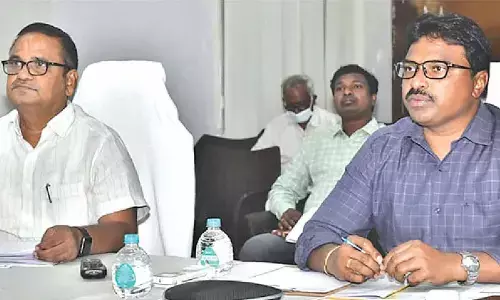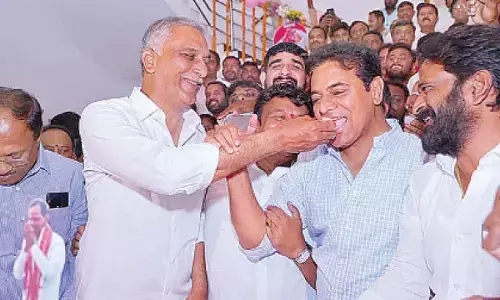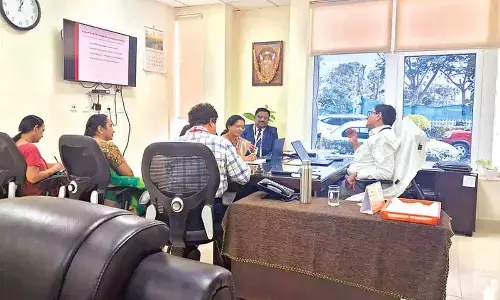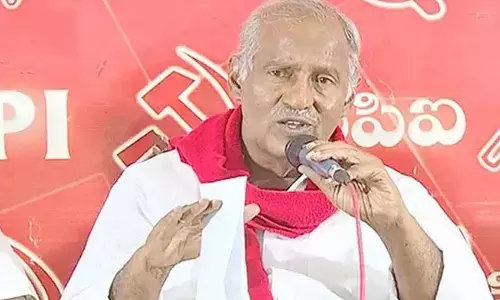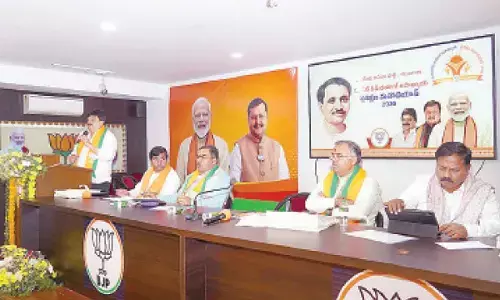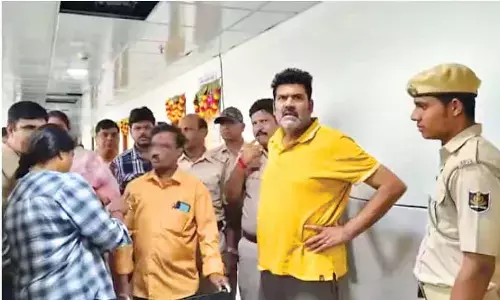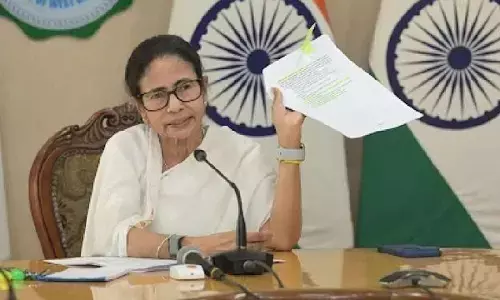Nehru legacy: Time to count its blessings
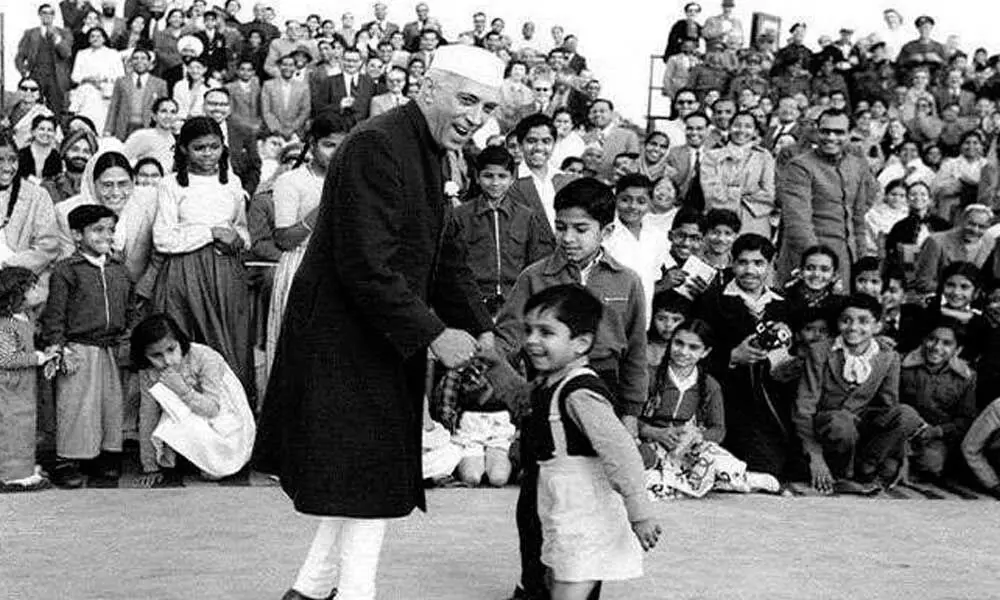
Nehru legacy: Time to count its blessings
May 27 marks the 57th death anniversary of free India’s first Prime Minister Pandit Jawaharlal Nehru, who is rightly hailed as the ‘Architect of Modern India’
May 27 marks the 57th death anniversary of free India's first Prime Minister Pandit Jawaharlal Nehru, who is rightly hailed as the 'Architect of Modern India'. The gambit of Prime Minister Narendra Modi to malign and run down the immense contribution of Nehru is bound to end up in a major fiasco. It is not only difficult, but even impossible, for the nation to forget the Nehruvian legacy. Nehru laid the foundation for transformational changes, paving the way for India's eventual emergence as a major economic hub on the global centrestage.
Nehru spent the best part of his life in prison. When he was undergoing imprisonment and suffering, there was no hope that India would be free and he would lead the newly-liberated nation. It was his self-effacing service to the nation that made Nehru the greatest Son of India.
When he did become the First Prime Minister, he worked relentlessly and without rest for national progress and advancement. Indeed, the nearly 18 years of his tenure, first as Interim Prime Minister from September, 1946, and then from Indian Independence on August 15, 1947, till his demise on May 27, 1964, bear witness to his record of unparalleled Service to the Nation. In fact, Nehru prided in calling himself as the Prime Servant of the Nation. That was the humility of the man, which stands out in sharp contrast to someone for whom the nation's history begins only in 2014.
As Congress Odisha incharge, I have seen how Pandit Nehru laid the foundation-stone for the State Capital of Bhubaneswar, for Paradip Port, Rourkela Steel Plant, Hirakud Dam and ever so many visible symbols of development in the State. Can anyone, in a proper frame of mind, deny or refuse to recognize, the role of Pandit Nehru as the architect of modern India?
Thanks to the vision and statesmanship of Pandit Nehru, India has today emerged as the leader in the space programme and as the Nuclear Power, globally. It was Nehru, who laid the foundations for the Indian space and nuclear programmes.
Thanks again to Nehru, the nation took giant strides and achieved transformational changes. India undertook several revolutions simultaneously, like the agricultural, industrial and technological revolutions.
India lives in her villages, as Gandhiji once famously said and it was for this reason that Nehru developed agriculture, by boosting irrigation facilities with Bhakra Nangal, Hirakud and Nagarjunasagar Dams. In a country, where not even a pin was produced, Nehru set up heavy industries. He developed educational institutions, with a number of universities, IITs, IIMs, besides achieving expansion in school education. Nehru also focused on Micro, Small and Medium Industries and promoted Khadi & Village Industries Commission. To realise Gandhiji's dream of Gram Swaraj, he started the Panchayati raj institutions at the grassroots level, as the third tier of Indian democracy, after Parliament at the national level and the Legislatures at the States level.
Indian Independence brought in its wake the horrors of Partition. There were there largescale massacres on both sides of the borders, both in the West and the East. While largescale refugees poured into India, large sections of Minorities, who decided by choice to stay back in India, there was an insistent and imperative need to instill a sense of security and confidence among them.
When India was celebrating her Independence on August 15, 1947, Father of the Nation Mahatma Gandhi was away in the far-off Noakhali, where Hindus were being targeted. It was Gandhiji's fast-unto-death that brought both the warring communities to lay down arms at his feet. This is in contrast to the Politics of Hate being propagated on what is described as Muslim Appeasement that is wrongly and wantonly attributed to the Congress and its cherished leadership.
Gandhiji conquered hate, not with counter-hate campaign, but with love. That showed the way forward for India. The Hindus, who constitute the majority of the population, and the Muslims, who are the largest Minority in India, live in peace and brotherhood. That is the shining symbol of Secularism, which is now sought to be rejected and run down for purely political and partisan ends.
That was also the time when Pakistan launched its first-ever aggression against India in October, 1947, just in two months since the Indian Independence. Soon after, Gandhiji fell to the assassin's bullets on January 30, 1948, as a result of the vicious and virulent Hate Campaign unleashed by the detractors of the Congress.
When the fledgling nation was being buffeted by such stormy events, Pandit Jawaharlal steered the ship of the nation, bringing peace and stability, which were the necessary precondition for progress and development. Pandit Jawaharlal Nehru gave us the sterling ideals of National Unity and Integrity, Democracy, Socialism, Secularism, Non-Alignment and World Peace.
At a critical and crucial juncture, when India, at her Independence, was struggling to stave-off challenges to her existence, National Unity and Integrity assumed paramount importance. That was also the time when Pandit Nehru not only laid the foundation for democracy in the country, but nurtured it. Democracy has all but disappeared in several countries, which became free at about the same time as India, But in India, if democracy has taken roots, which enabled the rise to power of Prime Minister Modi, credit goes to Pandit Jawaharlal Nehru.
Democracy is meaningful only when there is social and economic equality and that is why Nehru paved the way for a Socialistic Pattern of Society, which became the national credo. To emotionally integrate two important communities, Nehru employed Secularism, which enabled the nation to achieve Unity in Diversity. Secularism is the weaving thread of India that holds the nation together and it became envy of the world.
To pull the world back from the brink of a possible nuclear catastrophe posed by the division of the world into two Power Blocs, the Western and the Eastern Blocs, Pandit Nehru came up with the policy of Non-Alignment, which provided a credible alternative to the emerging nations of the world, most of whom joined the Non-Aligned Movement (NAM), making it into a powerful force for peace.
World Peace was no longer a distant ideal to aspire for but a practical reality, especially after the nuclear bombs used on Nagasaki and Hiroshima in Japan in August, 1945. Nehru saw a great stake for India and the under-developed and developing nations of Asia, Africa and Latin America in enduring World Peace. Nehru wanted war to be outlawed, as use of force for settling international disputes is no longer possible, with the looming threat of the nuclear devastation and destruction hanging over the heads of the nations.
Not only Nehru believed in the need to inculcate in the people a scientific temper, in order to build a modern nation, but also used science and technology to achieve rapid advancement of the nation. Regional Research Laboratories chain was started. As the nation pays its tribute to this great Son of India, it is also time to revisit the Nehruvian legacy and reassess his immense contribution to the all-round developed of India.
(The writer is a former AICC Secretary in charge of Odisha and former MLC.)



